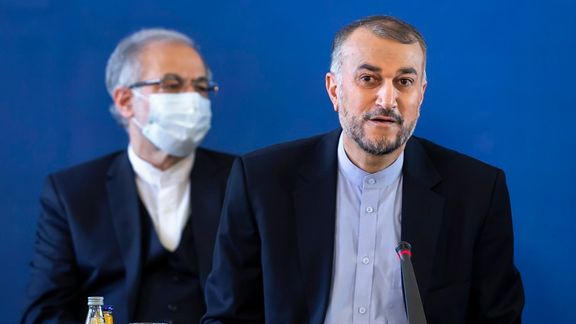Iran Says Nuclear Talks Before December But Wants $10 Billion Released

Iran’s foreign minister has said Tehran will decide soon on when to return to nuclear talks, and has again requested US unfreeze $10 billion to show good will.

Iran’s foreign minister has said Tehran will decide soon on when to return to nuclear talks, and has again requested US unfreeze $10 billion to show good will.
Speaking to reporters in Tehran after a conference on Afghanistan, Hossein Amir-Abdollahian said Iran would decide on when to return to nuclear talks in Vienna after discussions in Brussels between Deputy Foreign Minister Ali Bagheri-Kani and the European Union’s Enrique Mora, who coordinates the Vienna process.
After meeting Mora, Bagheri tweeted from Brussels that they had reached agreement to resume negotiations before the end of November, with the exact date confirmed “next week.”
Not too far away
Amir-Abdollahian put as “not too far away” the date for resuming talks with the “4+1” – the five world powers without the US, which takes part in Vienna indirectly – and said this date would be set “Wednesday night or after [Bagheri-]Kani’s return to Iran, if we need more consultations.”
Amir-Abdollahian added, “We do not want to return to negotiations from the point of an impasse at Vienna talks, but we accept the format of the Vienna talks.”
Amir-Abdollahian said Iran’s need for clarification with the EU had involved discussing “how all the parties who return to the agreement will demonstrate that JCPOA sanctions against Iran would be fully lifted.” Iran did not, he explained, want to “return to negotiations from the point of an impasse at Vienna talks, but we accept the format of the Vienna talks.”
Iran suspended in June its participation in the Vienna talks, aimed at reviving its nuclear 2015 deal with world powers, first for the presidential election and then so new president Ebrahim Raisi (Raeesi) could prepare for the talks. But almost three months after Raisi’s inauguration, Tehran has stalled over agreeing a date to return to Vienna.
Concerned over delays
The three European signatories of the agreement – the JCPOA, Joint Comprehensive Plan of Action – and to a lesser extent Russia and China have expressed concerned over the delay. After the US left the JCPOA in 2018, Iran began exceeding the deal’s nuclear limits and is now enriching uranium to 20 and 60 percent purity, reducing the time needed to acquire 90-percent-purified uranium for a nuclear device.
Amir-Abdollahian also referred to a looming trip to Tehran of Rafael Mariano Grossi, head of the International Atomic Energy Agency, as “certain” although the date was “not important.” Grossi has requested an urgent meeting to revolve disagreement over IAEA access to the Karaj site where Iran makes centrifuges, which are used to enrich uranium.
While many diplomats involved in the Vienna process felt progress was made, there was difficulty agreeing which US sanctions contravened the JCPOA and exactly how the expanded and improved Iranian atomic program should be brought back within the JCPOA.
Tehran has argued that some US sanctions ostensibly on grounds other than the nuclear program impede its ability to benefit from the JCPOA and that it needs guarantees that Washington would not again withdraw from the agreement as previous president Donald Trump did in 2018.
“[President Joe] Biden must demonstrate his will about returning to JCPOA,” Amir-Abdollahian said. “We are not so eager for America’s return to the JCPOA for the sake of returning. The important issue is the result, if it is to Iran’s benefit or not. Would America return in order to lift sanctions, or to impose new limitations?”
Unfreezing $10 billion of Iran’s funds – this is money owed to Iran by third countries fearing US punitive action – would, Amir-Abdollahian said, “show that Americans are serious about lifting the sanctions.”